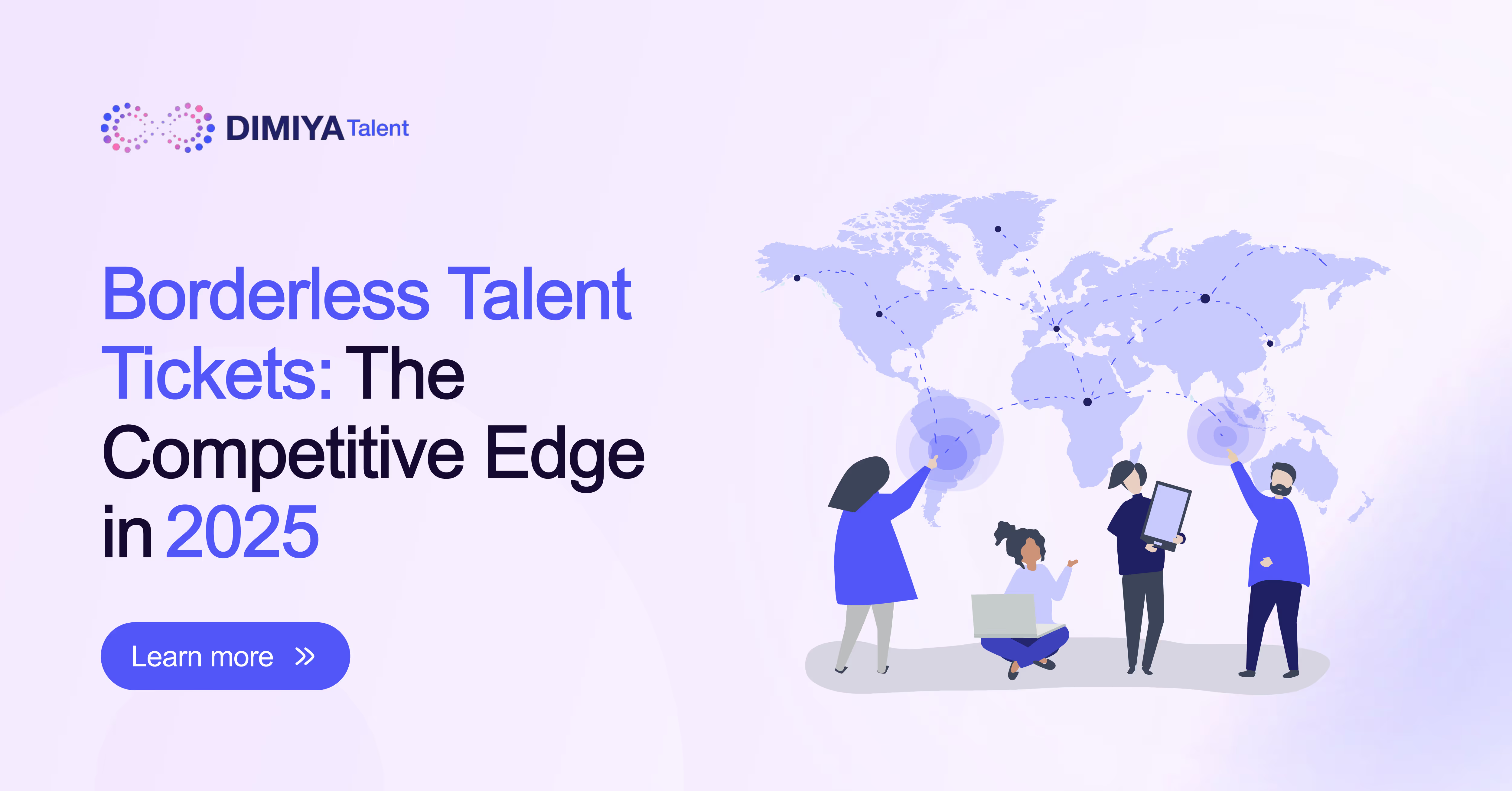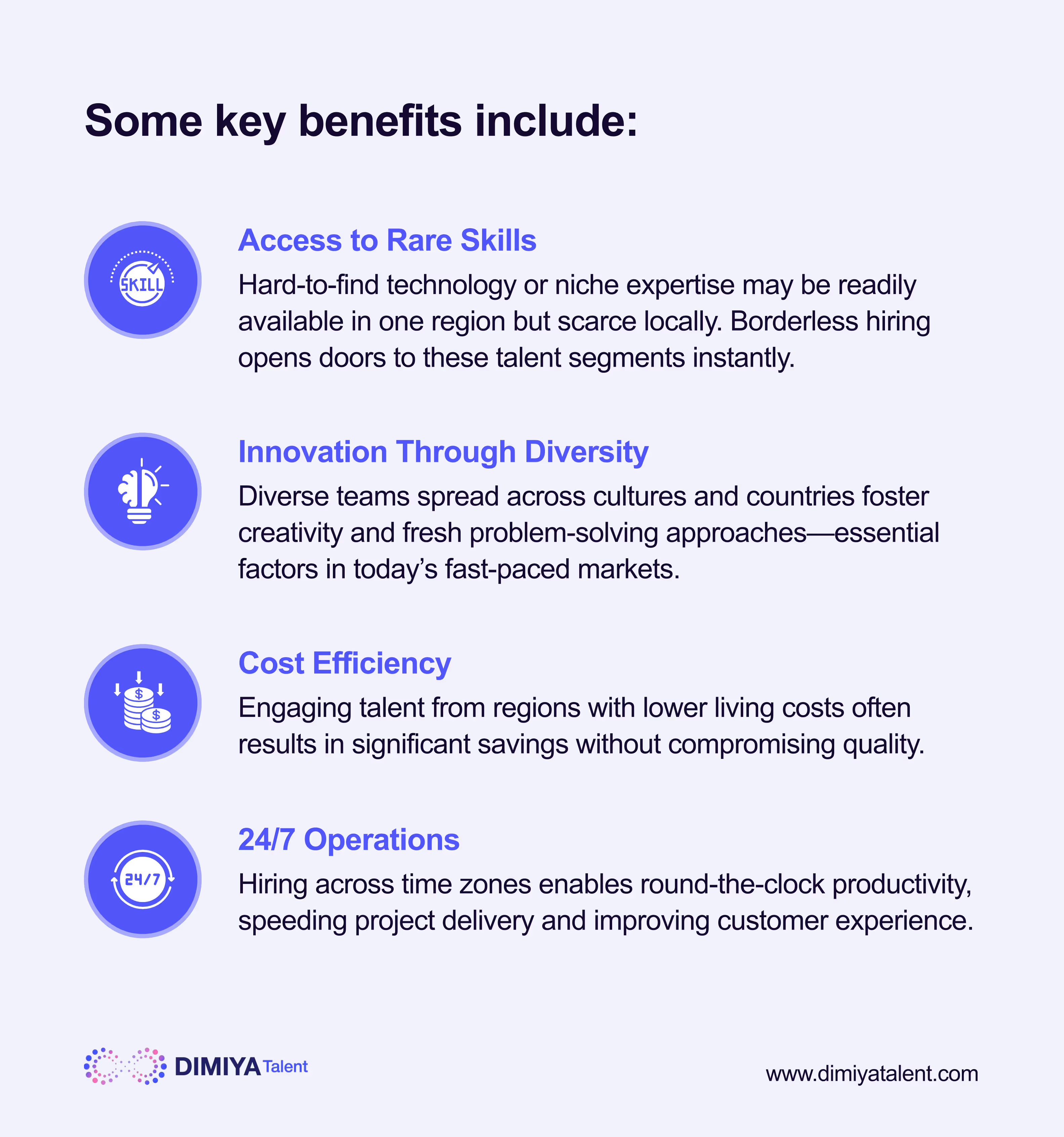
Borderless Talent Tickets: The Competitive Edge in 2025
In today’s rapidly evolving business landscape, one truth has become clear: talent knows no borders. As companies navigate the complexities of digital transformation, shifting economic conditions, and heightened competition, the ability to tap into global talent pools has transformed from a strategic advantage into a business necessity.
Looking ahead to 2025, “borderless talent tickets” are redefining how organizations build their teams, deliver results, and gain a competitive edge. By leveraging a global workforce, companies can access rare skills, embrace diversity-driven innovation, save costs, and operate seamlessly around the clock.
Access to Rare Skills
The demand for specialized skills—particularly in technology, cybersecurity, AI, data science, and cloud computing—continues to outpace local supply in most regions. Businesses often find themselves struggling to fill critical roles that are essential for growth.
Borderless talent hiring bridges this gap. Instead of limiting searches to local candidates, companies can expand their reach to regions where these skills are more abundant. For instance, a Scandinavian software company might collaborate with engineers in Sri Lanka, while an Australian fintech startup could source niche cybersecurity talent from Eastern Europe.

The result? Faster access to hard-to-find expertise, reduced hiring delays, and the ability to keep pace with innovation.
Innovation Through Diversity
Diversity is no longer just a buzzword—it is a catalyst for innovation. Teams composed of professionals from different cultural, educational, and professional backgrounds bring fresh perspectives and unique problem-solving approaches.
When companies embrace borderless hiring, they create a melting pot of ideas that fosters creativity and agility. Diverse teams are better equipped to anticipate customer needs across different markets, adapt to cultural nuances, and deliver solutions that resonate globally.
Research consistently shows that organizations with diverse teams outperform their peers in innovation metrics, employee engagement, and even revenue growth. By 2025, companies that fail to embrace diversity risk being left behind in increasingly dynamic markets.
Cost Efficiency Without Compromise
The financial benefits of borderless hiring are undeniable. Engaging talent from regions with lower living costs often translates to significant savings—without compromising quality.
For example, instead of paying a premium for a developer in London or San Francisco, businesses can partner with equally skilled professionals in Colombo, Warsaw, or Manila at a fraction of the cost. These savings can be reinvested into R&D, marketing, or scaling operations.
Moreover, cost efficiency is not limited to salaries. Companies can reduce overhead costs tied to office space, equipment, and infrastructure by embracing remote-first teams. This flexible workforce model allows organizations to remain competitive while maintaining financial agility.
24/7 Operations
Time zones, once seen as barriers, have become opportunities. Global hiring enables companies to run operations around the clock, ensuring projects move forward even while one region sleeps.
For customer-facing industries, this translates to improved support and responsiveness. For technology companies, it means faster product delivery, shorter development cycles, and continuous progress.
In 2025, companies leveraging 24/7 operations through borderless teams will enjoy a significant productivity advantage over competitors limited by traditional working hours.
The Human Element: Trust and Collaboration
While the benefits of borderless hiring are clear, success depends on more than just recruiting talent from abroad. It requires building trust, fostering strong communication, and providing the right tools for collaboration.
Modern platforms for project management, video conferencing, and secure file sharing make it easier than ever to integrate remote employees into company culture. Regular check-ins, transparent performance metrics, and inclusive leadership styles ensure that teams remain aligned despite geographical distances.
Ultimately, borderless hiring is not about outsourcing—it’s about extending the company’s ecosystem to include the best minds worldwide.
The Competitive Edge in 2025
As we step further into 2025, the companies that embrace borderless talent will be those that thrive. They will innovate faster, operate more efficiently, and deliver greater value to their customers.
The competitive edge will no longer lie solely in products or services—it will be in the people who create them. By unlocking access to global skills, embracing diversity, optimizing costs, and ensuring around-the-clock productivity, organizations can position themselves as leaders in a borderless world.
The future of work is here. The question is no longer if your company should embrace borderless talent, but how quickly you can adapt to seize the opportunity.
✅ Key Takeaway: In 2025, borderless talent isn’t just an option—it’s a ticket to growth, resilience, and lasting competitive advantage.
